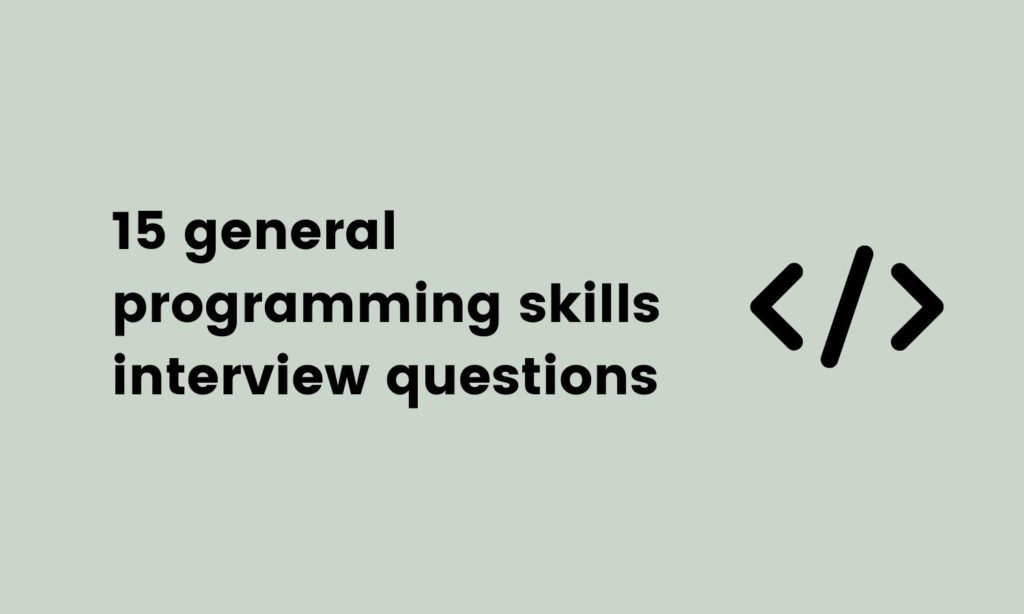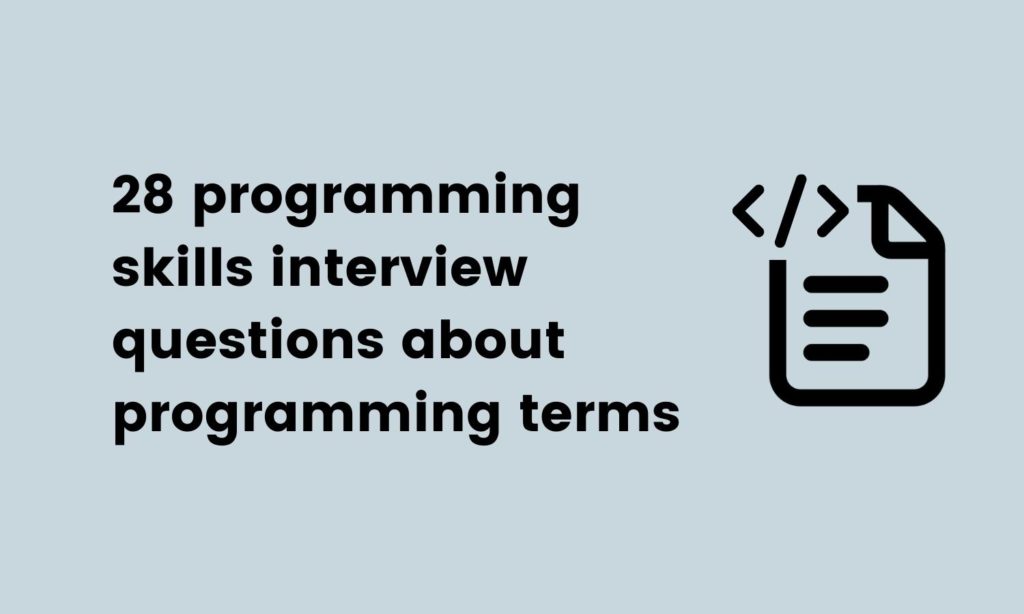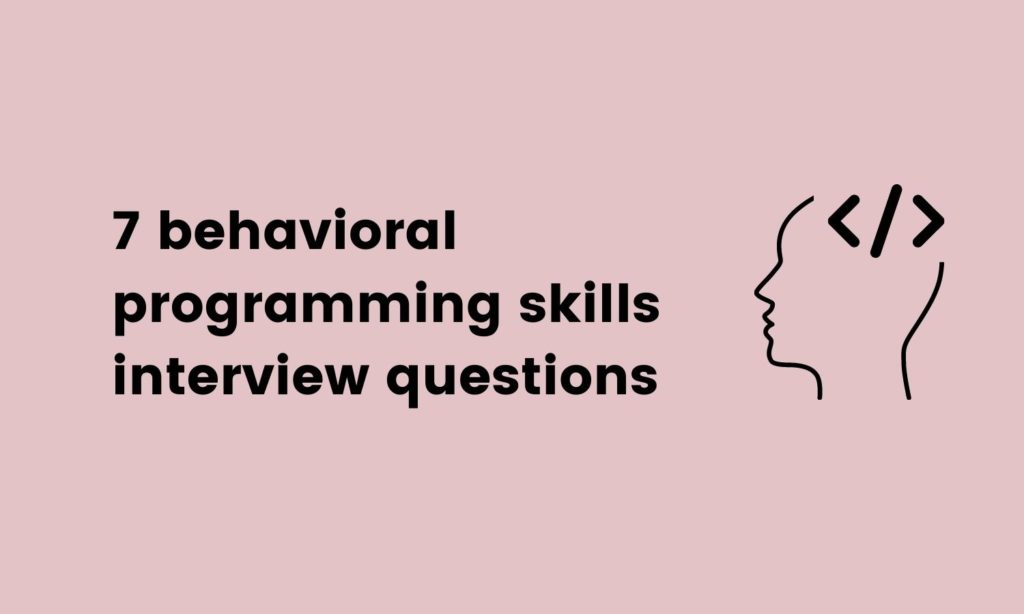50 programming skills interview questions
Are you looking to hire an expert programmer for your team?
This can be a challenging process, part of which involves interviewing.
To ensure the interviewing process goes well, you must use the best programming skills interview questions to assess your candidates. And it’s critical that you use a skills-testing approach before this stage to simplify the hiring process.
Skills testing is the easy part. It’s preparing the interview questions that can be a bit of a challenge.
Have you prepared the right interview questions for the interview stage?
If you’re not sure whether your list is thorough enough, read through this article to get our comprehensive list of 50 programming skills interview questions (and a few secret tips on skills testing.)
Table of contents
- 15 general programming skills interview questions
- 5 vital general programming skills interview questions and answers
- 28 programming skills interview questions about programming terms
- 5 vital programming skills interview questions and answers about programming terms
- 7 behavioral programming skills interview questions
- 5 vital behavioral programming skills interview questions and answers
- When should you use programming skills interview questions?
- For what roles can you use programming skills interview questions?
- What interview types should you use when asking programming skills interview questions?
- How can non-technical HR professionals prepare for programming skills interviews?
- Use skills testing and programming skills interview questions to hire the best
15 general programming skills interview questions
In this section, we’ve listed 15 general programming skills interview questions you can ask candidates to understand their general programming ability.
Take a look and decide which questions to include in your interview.
Explain what computer programming is.
Outline three types of errors that can happen during computer program execution.
What are the key features of an algorithm?
Give three examples of reserved words.
Outline three of the main loops in computer programming.
Describe the two main constants.
What are operators used for?
Describe the four key operators.
Give an example of a high-level programming language.
Give an example of a low-level programming language.
Why is software testing necessary?
How are linear data structures different from non-linear data structures?
Explain what the Fibonacci search algorithm is and what it’s used for.
Explain how recursive algorithms work.
Why is program documentation necessary?
5 vital general programming skills interview questions and answers
Here are five of the most important general programming skills interview questions from the list above and answers to listen for when you interview your applicants.
1. Explain what computer programming is.
Computer programming is the process of writing instructions for a computer in the form of code. Developers write the code in a programming language, and it is then translated into a notation the computer can understand so that it can perform some task.
On top of coding algorithms, computer programming involves debugging and code maintenance.
2. Outline three types of errors that can happen during computer program execution.
Candidates should know the three main types of errors that can occur when a computer program is being executed:
Logical errors – errors in a program’s logic that cause the program to behave incorrectly
Runtime errors – errors that occur while the program is running
Syntax errors – errors in the syntax of the code that prevent the program from running, such as incorrect spelling or punctuation
3. What are the key features of an algorithm?
The vital features of an algorithm are:
Finiteness – after a defined number of steps, the algorithm should stop
Definiteness – an algorithm should have defined, ordered steps
Efficiency – algorithms shouldn’t contain any redundant steps
4. Describe the four key operators.
Candidates should know the four key types of operators:
Arithmetic operators – operators that developers use to perform mathematical operations
Assignment operators – a kind of operator developers use to store values, like numbers and strings
Logical operators – operators that developers use to combine simple conditions and make complex ones
Relational operators – a type of operator developers use to test the relationship between two entities
5. Why is software testing necessary?
Software testing is important for assessing a software application’s quality and whether it delivers a good user experience.
Candidates may bring up other reasons why testing is essential. They may also mention that checking for ways to improve the software and ensuring that it meets users’ requirements are vital parts of software testing,
The best insights on HR and recruitment, delivered to your inbox.
Biweekly updates. No spam. Unsubscribe any time.
28 programming skills interview questions about programming terms
We have listed 28 programming skills interview questions on technical definitions and concepts in the section below.
Ask candidates these questions to evaluate their knowledge of programming terms.
Explain what a constant is.
Explain what “beta versions” of computer programs are.
What is an algorithm?
Explain what arrays are.
What is software testing?
Explain what computer-program maintenance is.
What are reserved words in programming?
Explain what a loop is in programming.
What is an operator?
What is the top-down design method?
Can you explain what program execution is?
Explain what a compiler is.
Define machine code.
Explain what variables are.
Define debugging and its relation to testing.
What is a data structure in programming?
Explain what sorting is.
Define binary search and explain when to use it.
Explain what LIFO means.
Explain what FIFO means.
Explain what a multi-dimensional array is.
What does NULL mean in programming?
What does “void” mean in programming?
Explain what data abstraction means.
Explain what a subroutine is.
Explain what program implementation means.
What is a graph in programming?
Explain what an AVL tree is.
5 vital programming skills interview questions and answers about programming terms
Here are five programming skills interview questions related to programming terms and some examples of answers you should look for.
1. Explain what a compiler is.
Do your candidates know that a compiler translates code written in one language into a different language? Can they explain that compilers convert code written in high-level programming languages (like C++) into lower-level languages (such as machine code)?
2. Explain what LIFO means.
LIFO is one way to access and store data. This acronym stands for “last in, first out” and means that the most recently stored data element is accessed and retrieved first. Can your candidates explain that the LIFO method is used in a stack?
3. Explain what FIFO means.
FIFO is another way to access and store data. The acronym stands for “first in, first out” and means that the oldest stored data element is accessed and retrieved first. Can your candidates explain that the FIFO method is used in a queue?
4. What does NULL mean in programming?
Candidates should understand that NULL is a placeholder value that indicates that a variable has no value. This is different from a value of “0”.
5. What does “void” mean in programming?
Candidates should know that “void” represents “nothing” or the lack of a data type. They may also mention that when void is used as a function’s return type, the function does not return a value.
7 behavioral programming skills interview questions
We have listed seven behavioral programming skills interview questions in this section.
Take your pick from these questions, and ask them to your candidates to determine how they act when given programming responsibilities.
Have you ever led a programming project? Which approaches did you use?
Which coding best practices do you follow?
Do you add comments to your code? Why, or why not?
Which sorting techniques do you use and why?
Which method would you use to remove characters from a string?
How would you manage data using dynamic memory allocation?
How do you explain technical concepts to non-technical business leaders?
5 vital behavioral programming skills interview questions and answers
Here are five critical behavioral programming skills interview questions and the answers you should listen for when interviewing your applicants.
1. Have you ever led a programming project? Which approaches did you use?
Asking candidates this question can reveal how experienced they are and shed light on their ambition and drive. Top answers will show that your candidate can visualize all the phases required to complete a project efficiently and prioritize tasks to complete them in the correct order.
It’s possible that your candidate hasn’t led a programming project. In this case, listen for evidence that they have the passion needed to lead a project if you give them a chance, and note how they would approach this responsibility.
2. Which coding best practices do you follow?
There are several coding best practices that candidates may mention, including:
Using comments in code
Avoiding deep nesting
Writing simpler, more efficient code
Following the DRY principle
Using simple naming conventions
3. Do you add comments to your code? Why, or why not?
The best candidates should be able to confidently explain the importance of adding comments to code. For example, they may mention that comments can help other developers find a particular line of code among hundreds or even thousands of lines.
4. Which sorting techniques do you use and why?
Candidates should know that sorting involves arranging elements in either descending or ascending order and that there are many types of sorting techniques. They may provide several examples of these techniques, such as:
Merge sorting – a powerful sorting algorithm that programmers use in several applications
Quick sorting – a partitioning sorting algorithm that puts smaller elements before an array’s pivot
5. How do you explain technical concepts to non-technical business leaders?
Can your candidates break down complex technical concepts when explaining them to a non-technical business leader?
This critical programming skills interview question will help you understand if candidates can interact with business leaders in a technical environment. It will also show whether they have the communication skills required to share complex information.
When should you use programming skills interview questions?
Use these programming skills interview questions after crafting a detailed programmer job description and conducting skills assessments
Completing the hiring process in this order will save you valuable time and ensure that the best programmers pass through to the interview stage.
It’s also useful to use programming skills interview questions after skills testing because you may find it easier to get ideas for your list of questions based on the results of your candidates’ skills tests.
Finishing skills testing first helps you reduce the length of time to hire candidates without losing any efficiency during the hiring process since the tests are thorough, accurate, and fast.
For what roles can you use programming skills interview questions?
You can use programming skills interview questions for many roles, including the following:
Video-game programmers
Web developers
Analyst programmers
Database developers
Quality-control specialists
Network-system administrators
What interview types should you use when asking programming skills interview questions?
HR professionals can choose either a structured or an unstructured interview process when asking programming skills interview questions.
Structured interviewing involves asking all of your candidates the same questions, normally in the same order. This helps you learn whether candidates have the particular programming skills that the job requires.
Unstructured interviews use open-ended questions, such as “Which sorting techniques do you use and why?” or “What are your greatest programming skills, and which skills do you need to improve?”
There is no particular agenda, and the applicant can share information about their programming experience in a structure-free interview.
We recommend that you use structured interviewing methods since they tend to be a safer choice legally, particularly in regard to discrimination cases. They also make comparing applicants’ responses much easier.
How can non-technical HR professionals prepare for programming skills interviews?
If you consider yourself a non-technical HR professional, you can follow a few steps to prepare for a programming skills interview.
Not only should you ask for help from your supervisor, but you can also:
Use skills testing at the beginning of the hiring process to help you evaluate your candidates’ technical skills straightaway
Use a phone-screening process before the interview and ask precise questions to screen out candidates who lack the programming skills required
Ensure you have the right list of programming skills interview questions for the main interview and take a look at lists like ours to help you
Use skills testing and programming skills interview questions to hire the best
Hiring the perfect programmer for your team can be simpler than you think. Using skills testing and the right interview questions can make the process simpler.
There’s no need to lose hope when you receive a stack of resumes from applicants who claim they are proficient programmers.
Hire the best programmer for your organization. Check out TestGorilla’s skills tests, and start the hiring process confidently. Get started for free today.
You've scrolled this far
Why not try TestGorilla for free, and see what happens when you put skills first.

















